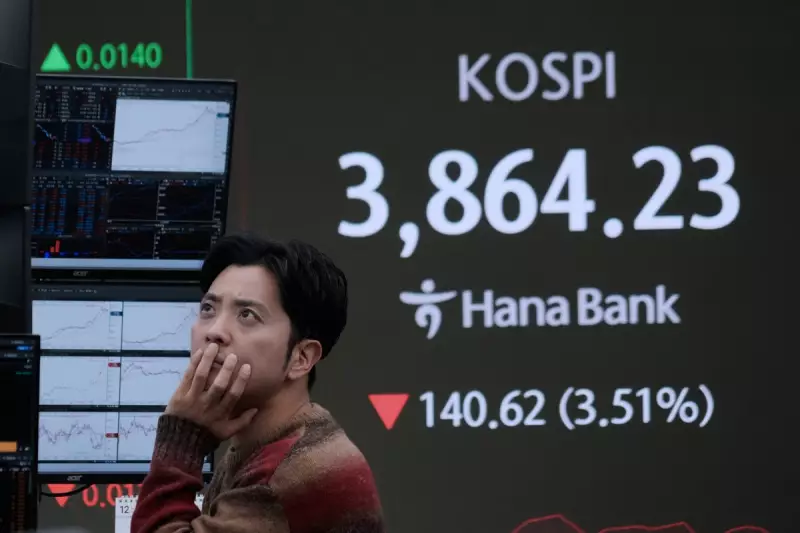
Asian Markets Mirror Wall Street's Sharp Reversal
Stock markets across Asia experienced significant declines on Friday, decisively wiping out the gains made during the previous trading session. The region's skittish trading activity directly mirrored a jarring reversal on Wall Street, where early optimism evaporated into steep losses by Thursday's close.
Major Benchmarks and Regional Falls
The sell-off was broad-based, impacting all major Asian financial hubs. In Japan, the Nikkei 225 index fell 2.4% to 48,645.95. Persistent concerns about a potential bubble in artificial intelligence-related shares were a primary driver. This anxiety was compounded by better-than-expected U.S. jobs data, which reduced the likelihood of an interest rate cut from the Federal Reserve in December.
Investors in Japan are also awaiting a stimulus package announcement from Prime Minister Sanae Takaichi. Data released on Friday showed the country's annual inflation rate edged up to 3.0% in October 2025 from 2.9% in September. While Japan's overall exports rose in October, shipments to the U.S. fell, a drop attributed to higher tariffs under President Donald Trump. This was partially offset by increased exports to other parts of Asia.
The losses were even steeper in South Korea, where the KOSPI index tumbled 3.9% to 3,847.91. Tech giants led the decline, with Samsung Electronics sinking 5.8% and SK Hynix plunging 8.6%.
Chinese markets were not spared, with the Hang Seng index in Hong Kong skidding 2.3% to 25,237.94. The Shanghai Composite slid 1.8% to 3,860.77, with additional pressure coming from escalating diplomatic friction between China and Japan concerning Taiwan.
Other regional markets also retreated. Australia’s S&P/ASX 200 fell 1.5% to 8,425.30, and Taiwan’s Taiex pulled back by nearly 3.2%.
The Wall Street Domino Effect
The turbulence in Asia followed a dramatic session in the United States. Stephen Innes of SPI Asset Management described the situation, noting, "What began as a textbook 'Nvidia bounce' flipped into one of the most violent intraday reversals since the April dump, and Asia — ever the obedient understudy — marched directly into the same plunge tank on the open."
On Thursday, the S&P 500 erased early gains to fall 1.6% to 6,538.76. The Dow Jones Industrial Average dropped 0.8% to 45,752.26, and the Nasdaq composite sank 2.2% to 22,078.05. The most severe losses impacted the market's previous biggest winners, including Nvidia and cryptocurrencies. Bitcoin dropped below $87,000, a stark decline from nearly $125,000 just last month.
The market's fragility stems from two core worries: that AI-related stocks like Nvidia have become overvalued, and that the Federal Reserve may pause its interest rate cuts. Despite Nvidia reporting strong summer profits and a robust revenue forecast, it was not enough to sustain market confidence through the entire trading day.
In other early Friday trading, U.S. benchmark crude oil slid 77 cents to $58.23 per barrel. Brent crude lost 68 cents to $62.70 per barrel. The U.S. dollar fell slightly to 157.39 Japanese yen, and the euro rose to $1.1539.





